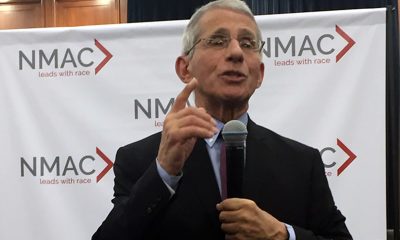World
Honduras government institutions ‘are murdering us’
Lack of opportunities, violence prompt LGBTQ people to migrate
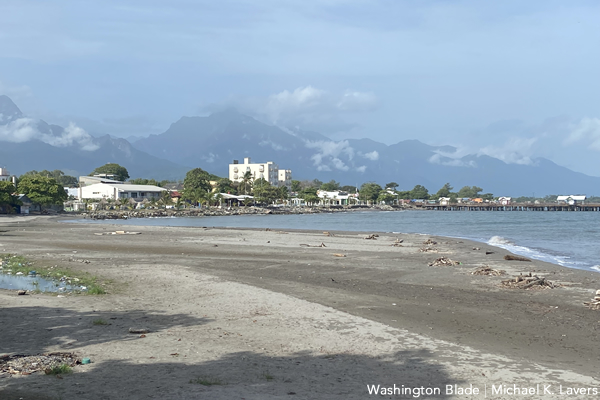
Editor’s note: International News Editor Michael K. Lavers was on assignment for the Washington Blade in Honduras, El Salvador and Mexico from July 11-25.
LA CEIBA, Honduras — Leonela and Jerlín, her partner of 11 years, and their school-age daughter live in La Ceiba, a city on Honduras’ Caribbean coast.
Jerlín was a bus driver in San Pedro Sula, the country’s commercial capital, until gang members shot him three times in 2012 because he couldn’t pay the extortion money from which they demanded from him each month. Jerlín, Leonela and their daughter subsequently fled to La Ceiba, which is about three hours east of San Pedro Sula.
“We left,” Jerlín told the Washington Blade on July 20 during an interview at the offices of Organización Pro Unión Ceibeña (Oprouce), a La Ceiba-based advocacy group. “We fled from there.”
Jerlín migrated to Mexico in January 2019, but returned to Honduras less than a month later because Leonela was in the hospital. The couple and their daughter migrated to Mexico a year later.
Leonela asked for a Mexican humanitarian visa for her and her daughter once they arrived in Ciudad Hidalgo, a Mexican border city that is across the Suchiate River from Tecún Umán, Guatemala.
Leonela told the Blade that she planned to ask for asylum in Mexico and wanted to go to Tuxtla Gutiérrez, the capital of Mexico’s Chiapas state, to find work. Leonela said she and Jerlín instead decided to return to Honduras because they did not want their daughter to further endure the “inhumane” conditions of the migrant detention center in Tapachula, a city that is roughly 20 miles northwest of Ciudad Hidalgo, in which they were living.
“We decided it was better to allow them to deport us,” said Jerlín.
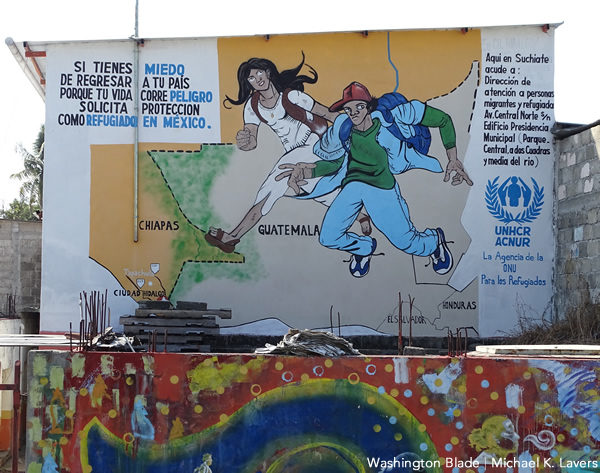
Jerlín, Leonela and their daughter returned to Honduras in May 2020. Someone shot at their house on July 10, 2020.
“They couldn’t even do what people wanted them to do, perhaps even buring us alive,” said Leonela.
Leonela and Jerlín are among the many LGBTQ Hondurans who have decided to leave Honduras in order to escape violence and discrimination based on sexual orientation and gender identity.
Vice President Kamala Harris and other Biden administration officials have acknowledged anti-LGBTQ violence is one of the “root causes” of migration from Honduras and neighboring Guatemala and El Salvador.
Title 42, a Centers for Disease Control and Prevention rule that closed the Southern border to most asylum seekers and migrants because of the coronavirus pandemic, remains in place. The White House has repeatedly told migrants not to travel to the U.S.
Roxsana Hernández, a trans Honduran woman with HIV, died at a New Mexico hospital on May 25, 2018, while in U.S. Immigration and Customs Enforcement custody.
Natasha, another trans Honduran woman, arrived in Matamoros, a Mexican border city that is across the Rio Grande from Brownsville, Texas, on Oct. 12, 2019. The previous administration forced her to pursue her U.S. asylum case in Mexico under its Migrant Protection Protocols. (The U.S. Supreme Court on Tuesday ordered the Biden administration to reinstate MPP.)
The Blade interviewed Natasha on Feb. 27 at a Matamoros shelter that Rainbow Bridge Asylum Seekers, a program for LGBTQ asylum seekers and migrants that Resource Center Matamoros, a group that provides assistance to asylum seekers and migrants in the Mexican border city, helped create. The U.S. less than two weeks later allowed Natasha to enter the country.
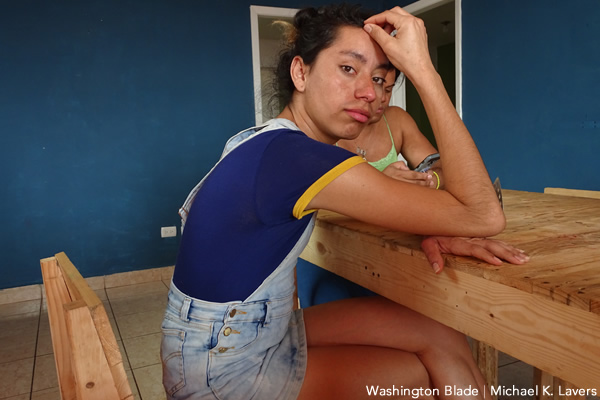
Oprouce Executive Director Sasha Rodríguez, who is trans, has participated in the State Department’s International Visitor Leadership Program.
She said a lack of employment and housing associated with the pandemic has prompted more Hondurans to migrate to the U.S., Mexico and Costa Rica. Rodríguez also told the Blade the U.S. and “our countries sell an American dream that doesn’t exist.”
“Why don’t these American organizations say don’t go,” she said, specifically referring to trans people who have decided to leave Honduras. “Here they see it as beautiful. They are already in the United States, but they were raped while trying to get there. They were kidnapped.”
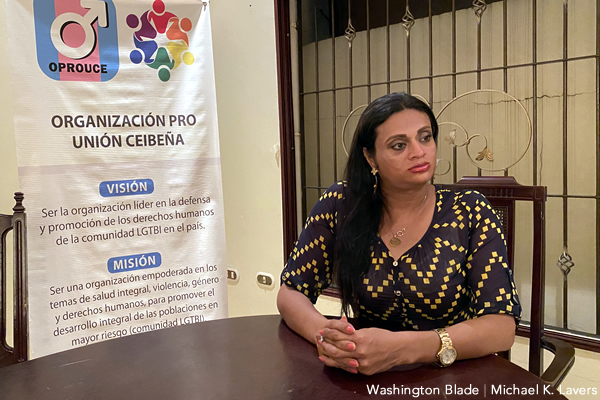
Alexa, a 27-year-old trans woman from La Ceiba, told the Blade she has friends who live in Mexico. Alexa said she would like to leave Honduras, but she doesn’t want to leave her mother alone.
“I don’t want to leave her alone and abandon her because I have always fought for her,” Alexa told the Blade during an interview at Oprouce. “She supports me as a woman.”
Alexa said she served a nearly 3-year prison sentence for attempted murder, even though she was defending herself against a woman who was hitting her in the face with a rock. Alexa began to sob when she started to tell the Blade about the Salvadoran man who raped her in prison. She said the warden then forced her to cut her hair and guards doused her with “ice cold water” in an isolation cell.
“I was a woman,” said Alexa. “They made me a man.”
Alexa told the Blade that other prisoners tried to kill her. She said she also tried to die by suicide several times until her release on Jan. 27.
Alexa said she has not been able to find a job since she left prison. She also told the Blade that gang members continue to threaten her.
“It is sometimes very difficult to lead the lifestyle that we lead as trans women in Honduras,” she said, referring to anti-trans discrimination and a lack of employment opportunities.
Venus, a 30-year-old trans woman who is also from La Ceiba, echoed Alexa.
“To be a trans person is synonymous with teasing, harassment, violence and even death,” Venus told the Blade at Oprouce.
Venus said Honduran soldiers regularly attack trans women. She told the Blade a lack of access to health care, machismo and patriarchal attitudes are among the myriad other issues that she and other trans Hondurans face.
“We don’t have access to education, to health (care), to a job,” said Venus. “Above all we are fighting for a gender-based law that recognizes us as women and men.”
Venus added she, like Alexa, would leave Honduras “if I was given the opportunity to do so.”
Landmark ruling finds Honduras responsible for trans woman’s murder
Red Lésbica Cattrachas, a lesbian feminist human rights group based in Tegucigalpa, the Honduran capital, notes 373 LGBTQ Hondurans were reported killed in the country between 2009-2020.
Statistics indicate 119 of those murdered were trans. Red Lésbica Cattrachas also noted 18 of the LGBTQ Hondurans who were reported killed were in Atlántida department in which La Ceiba is located.
Vicky Hernández was a trans activist and sex worker with HIV who worked with Colectivo Unidad Color Rosa, a San Pedro Sula-based advocacy group.
Hernández’s body was found in a San Pedro Sula street on June 29, 2009, hours after the coup that ousted then-President Manuel Zelaya from power. Hernández and two other trans women the night before ran away from police officers who tried to arrest them because they were violating a curfew.
The Inter-American Court of Human Rights in June issued a landmark ruling that found Honduras responsible for Hernández’s murder.
The ruling ordered Honduras to pay reparations to Hernández’s family and enact laws that protect LGBTQ people from violence and discrimination. The government of President Juan Orlando Hernández, whose brother, former Congressman Juan Antonio “Tony” Hernández, is serving a life sentence in the U.S. after a federal jury convicted him of trafficking tons of cocaine into the country, has not publicly responded to the ruling.
Rodríguez noted to the Blade that Oprouce and other advocacy groups have been fighting for a trans rights law in Honduras for more than a decade.
“We have had failure for 11 years, but I think that with what happened with the Inter-American Court, the recommendations that have come from the Vicky Hernández case could achieve something important,” said Rodríguez. “There are very good human rights recommendations for Honduras and there are good recommendations that Honduras could automatically apply to trans women.”
Rodríguez as she discussed the ruling reiterated trans Hondurans continue to face violence, discrimination and a lack of employment opportunities. Rodríguez also reiterated her sharp criticism of her country’s government and its institutions.
“Societal exclusion forces us to do sex work,” she said. “We are being harmed by our trade: Murder, persecution, hate crimes, torture, beatings.”
“I always say that it is an institutional death because state institutions are murdering us,” added Rodríguez.
‘My fight is here’
In spite of these challenges, Rodríguez said there has been progress.
Oprouce — which works on a variety of issues that include the prevention of gender-based violence and fighting HIV/AIDS — offers workshops to the Public Ministry, the Honduran Armed Forces and judges. Asociación de Prevención y Educación en Salud, Sexualidad, Sida y Derechos Humanos (Aprest), another advocacy group in Tela, a city that is about 60 miles west of La Ceiba, conducts similar trainings with local and national authorities.
Aprest Executive Director Leonel Barahona Medina told the Blade during an interview at a beachfront restaurant in Tela on July 20 that city officials have given him an office from which he and his colleagues can work. Barahona said they also supported activists who raised the Pride flag on June 27 in front of Tela City Hall.
A similar ceremony took place in a park in the center of La Ceiba.
“We have good relations with them,” said Barahona, referring to Tela officials.
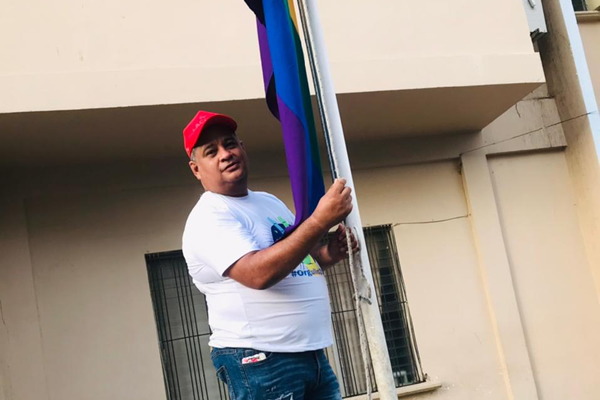
Both Barahona and Rodríguez said their work will continue.
“My fight is here,” said Rodríguez. “My essence and my dreams are here.”
Abdiel Echevarría-Caban and Reportar sin Miedo contributed to this story.
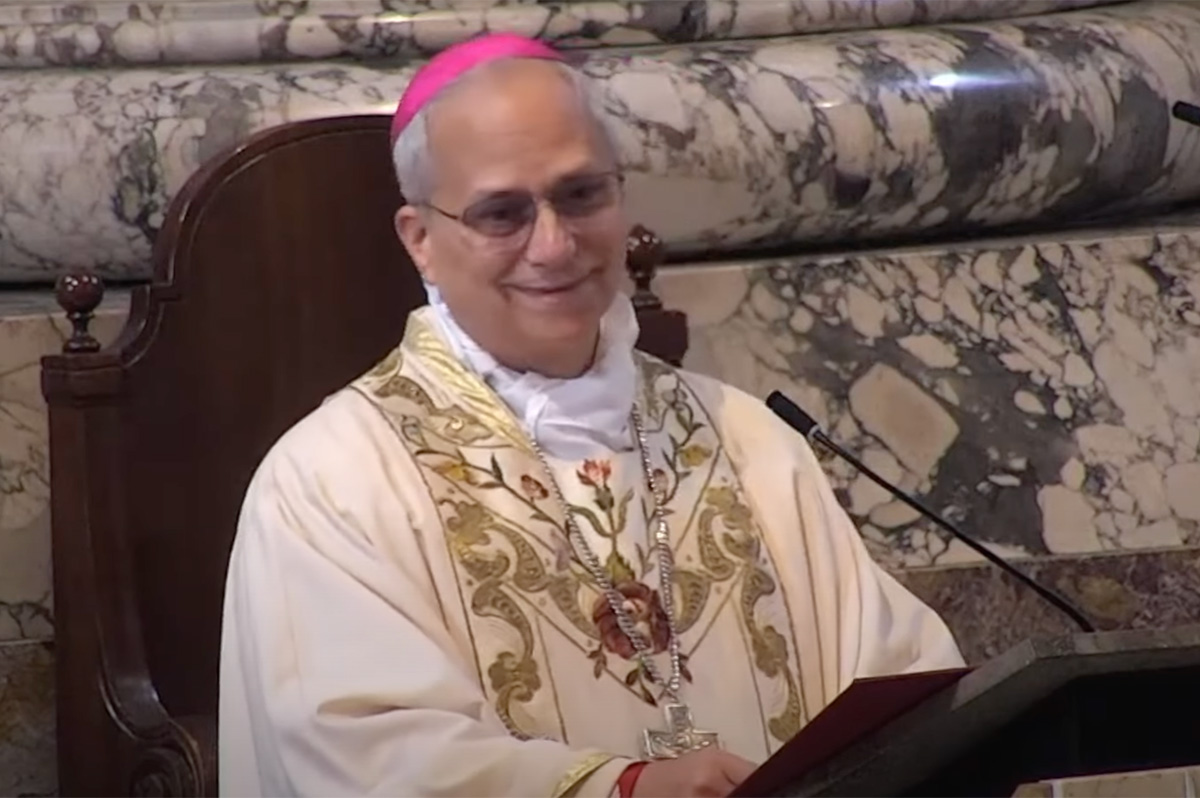
The College of Cardinals on Thursday elected Cardinal Robert Prevost from Chicago as the Catholic Church’s next pope.
Leo XIV’s election took place less than three weeks after Pope Francis died at Casa Santa Marta, his official residence at the Vatican. The conclave to choose his successor began on Wednesday.
Leo XIV, who was born in Chicago in 1955, is the first American pope.
Leo XIV was bishop of the Diocese of Chiclayo in Peru from 2015-2023. Francis made him a cardinal in 2023
“We salute the appointment of the new Pope Leo XVI,” said the U.S. Embassy in Peru on X.
“A celebration for the world’s Catholics, and a joy especially shared between the American people and the Peruvian people. From Chicago to Chiclayo.”
U.S. Rep. Robert Garcia (D-Calif.), a gay man of Peruvian descent, also congratulated Leo XIV.
“As a Catholic and Peruvian American, I wish Pope Leo XIV strength as he steps into his role as a global and spiritual leader,” said the California Democrat on X. “He has demonstrated that he believes in justice for the poor and immigrants. May his leadership reflect these ideals as he spreads peace across the world.”
As a Catholic and Peruvian American, I wish Pope Leo XIV strength as he steps into his role as a global and spiritual leader. He has demonstrated that he believes in justice for the poor and immigrants. May his leadership reflect these ideals as he spreads peace across the world.
— Congressman Robert Garcia (@RepRobertGarcia) May 8, 2025
Francis died on April 21 at Casa Santa Marta, his official residence at the Vatican. The conclave to choose the Argentine pontiff’s successor began on Wednesday.
The Vatican’s tone on LGBTQ and intersex issues softened under Francis’s papacy, even though church teachings on homosexuality did not change.
Francis, among other things, described laws that criminalize consensual same-sex sexual relations as “unjust” and supported civil unions for gays and lesbians. Transgender people were among those who greeted Francis’s coffin at Rome’s St. Mary Major Basilica before his burial on April 26.
The New York Times reported Leo XIV in a 2012 speech to bishops specifically cited “homosexual lifestyle” and “alternative families comprised of same-sex partners and their adopted children” when he said Western media and popular culture has promoted “sympathy for beliefs and practices that are at odds with the gospel”
Marianne Duddy-Burke, executive director of DignityUSA, a group that represents LGBTQ Catholics, traveled to Rome for the conclave.
She told the Washington Blade in a text message from St. Peter’s Square shortly after Leo XIV’s election that she “heard him speak” last October and “found him thoughtful and gently challenging.”
“[He] hasn’t said a lot since early 2010s. [I] hope he has evolved,” said Duddy-Burke. “His commitment to synodality is a hopeful sign.”
Her group later issued a statement.
“This election appears to signal a willingness to continue building on Pope Francis’s commitment to synodality and social justice,” said DignityUSA. “We pray that the needs of those whom our church has historically marginalized, including LGBTQ+ people and their families, will continue to be heard and addressed by the Vatican and other church leaders.”
Francis DeBernardo, executive director of New Ways Ministry, a Maryland-based LGBTQ Catholic organization, in a statement said there is “a special pride in having the first pope from the United States, his longtime ministry in Latin America most likely had an equally formative influence on his spirituality and approach to church issues.” DeBernardo, however, criticized Leo XIV’s 2012 comments.
“We pray that in the 13 years that have passed, 12 of which were under the papacy of Pope Francis, that his heart and mind have developed more progressively on LGBTQ+ issues, and we will take a wait-and-see attitude to see if that has happened,” he said.
“We pray that as our church transitions from 12 years of an historic papacy, Pope Leo XIV will continue the welcome and outreach to LGBTQ+ people which Pope Francis inaugurated,” added DeBernardo. “The healing that began with ‘Who am I to judge?’ needs to continue and grow to ‘Who am I, if not a friend to LGBTQ+ people?'”
DignityUSA agreed.
“We express concern with the former Cardinal’s statements — as reported in the New York Times — in a 2012 address to bishops, where he stated that Western news media and popular culture fostered ‘sympathy for beliefs and practices that are at odds with the gospel’ including the ‘homosexual lifestyle’ and ‘alternative families comprised of same-sex partners and their adopted children.'” We note that this statement was made during the papacy of Benedict XVI, when doctrinal adherence appeared to be expected,” said the organization in its statement. “In addition, the voices of LGBTQ people were rarely heard at that level of church leadership. We pray that Pope Leo XIV will demonstrate a willingness to listen and grow as he begins his new role as the leader of the global church.”
Vanuatu
Vanuatu lawmakers consider constitutional amendment to recognize two genders
Country decriminalized consensual same-sex sexual relations in 2007
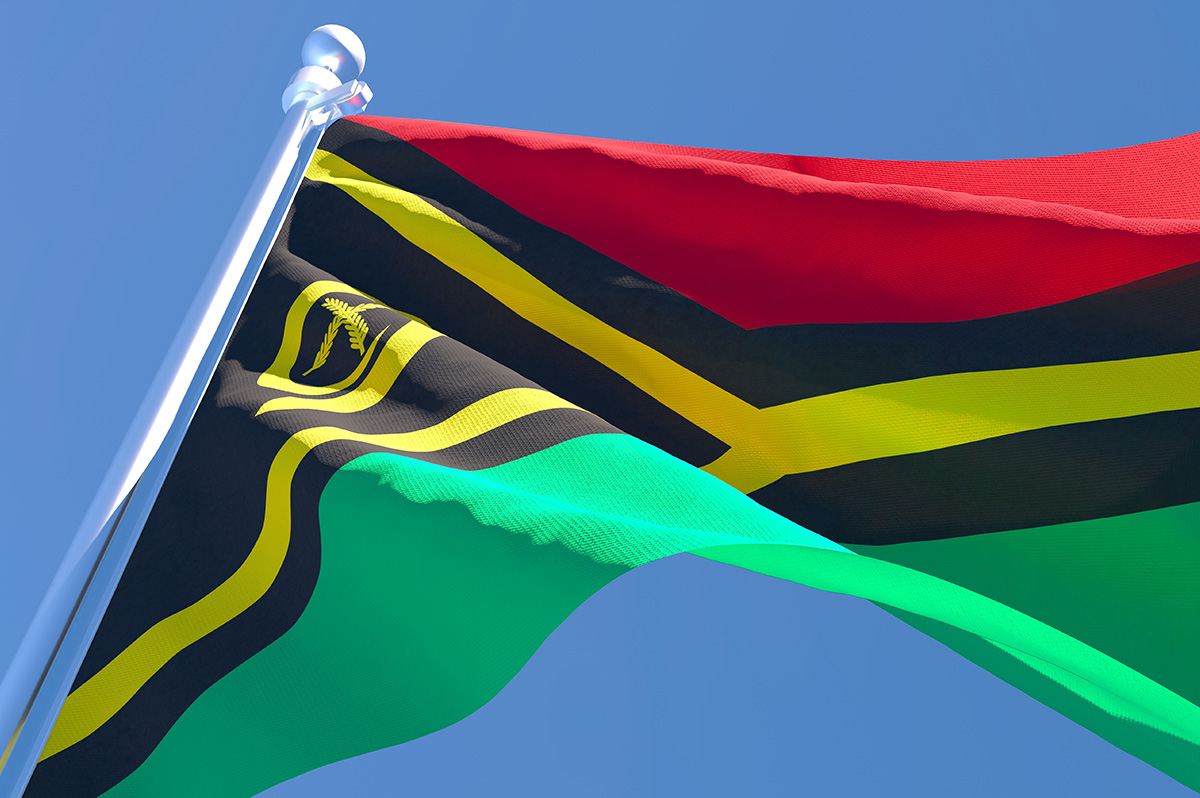
Lawmakers in Vanuatu are considering an amendment to the country’s constitution that would recognize only two sexes: Male and female.
The Vanuatu Daily Post in an April 23 article quoted Vanuatu Christian Council Chair Collin Keleb, a pastor with the Presbyterian Church of Vanuatu, said the country “cannot allow someone from outside to influence or empower them (the LGBTQ community), which will cause them to go astray instead of maintaining and uniting ourselves as children of God.”
The country’s Council of Ministers has approved the proposed amendment. The Vanuatu Daily Post notes the government has said the measure would “align the country’s laws with the preambles of ‘Melanesian values and Christian principles’ upon which Vanuatu was founded.”
Vanuatu is an island country in the South Pacific that is located roughly 1,100 miles northeast of Australia’s Queensland state.
Consensual same-sex sexual relations have been decriminalized in Vanuatu since 2007.
It remains unclear when the proposed amendment will receive final approval.
El Salvador
Artistas drag marchan por derechos laborales, visibilidad LGBTQ en El Salvador
Lady Drag y Wila la Icónica participaron en el desfile del 1 de mayo
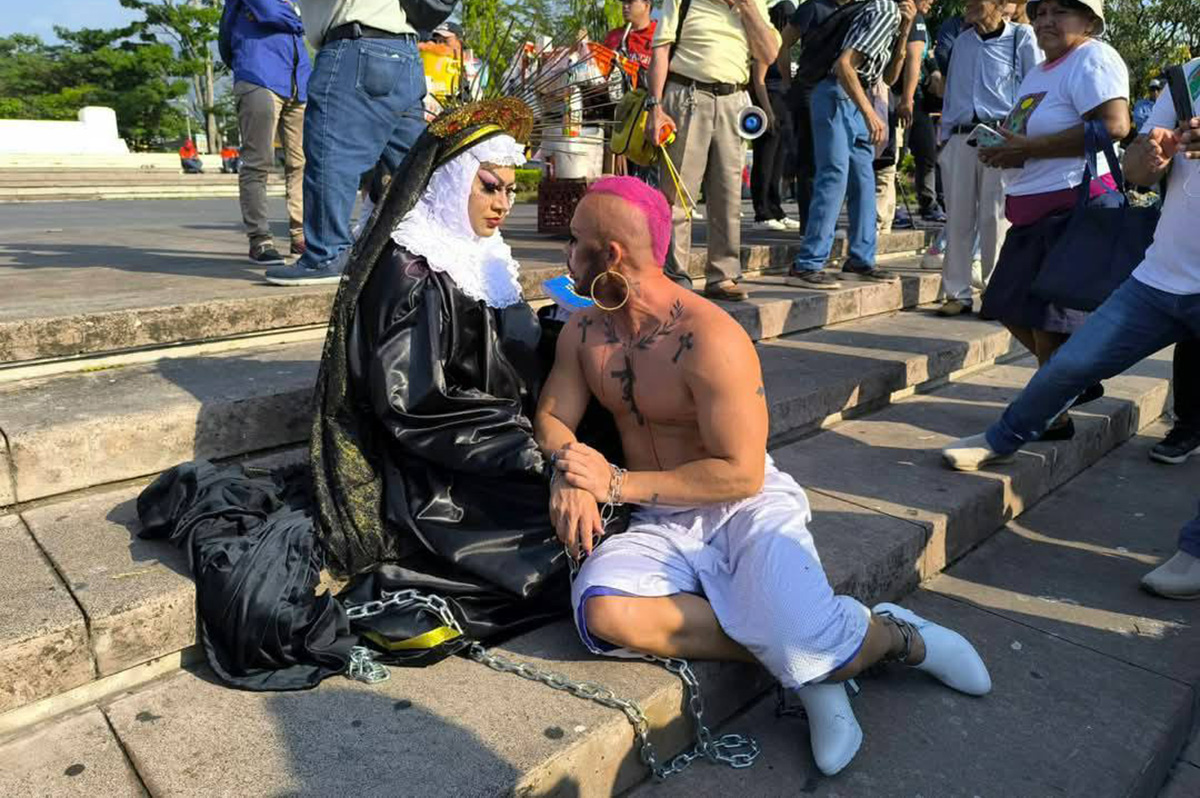
Dos artistas drag desfilaron este 1 de mayo por las principales calles de San Salvador como parte del recorrido de la marcha del Día Internacional del Trabajo, visibilizando realidades en la vulneración de los derechos humanos. La presencia de Lady Drag y Wila la Icónica destacó en medio de una movilización que, si bien contó con diversos sectores sindicales y sociales, registró escasa participación de organizaciones LGBTQ.
Con vestuarios llamativos y maquillaje escénico, las artistas se integraron a la marcha junto a otras expresiones ciudadanas. Durante todo el recorrido, desde el Parque Cuscatlán hasta el Monumento al Divino Salvador del Mundo, ambas realizaron un performance que buscó denunciar el desempleo, la precarización laboral y la exclusión de las diversidades sexuales y de género en el ámbito laboral.
“El Salvador necesita reformas no solamente en el código de trabajo, sino que también reformas en el sistema educativo”, expresó Lady Drag. “O sea, que nuestras autoridades también velen porque se nos respeten”, agregó refiriéndose a la población LGBTQ.
El performance incluyó desplazamientos performativos en donde el artista Wila la Icónica, rompió una constitución de la República de El Salvador. La representación culminó en El Salvador del Mundo, donde las artistas realizaron una pose simbólica frente al monumento, emulando una escena inspirada en “La Piedad”, como acto de denuncia y resistencia.
La participación de ambas artistas se produjo en un contexto de creciente precarización laboral para las personas LGBTQ en El Salvador, también en memoria de los detenidos injustamente por el régimen de excepción y como sus madres sufren por las negligencias del sistema. También mencionaron ser una pronunciación por los aumentos a las AFP y a la canasta básica ya que se avecina el aumento al salario mínimo.
De acuerdo con informes de organizaciones de derechos humanos, el sector LGBTQ enfrenta barreras estructurales para el acceso a empleos dignos, así como altos niveles de discriminación y violencia.
“Siempre hay ataques de intimidación, yo he sido víctima de ataques de intimidación de este gobierno, ataques de amenaza por hacer lo que hago y, sin embargo, no me han logrado doblegar y no me van a lograr doblegar”, concluyó Lady Drag.
Pocas propuestas, mucha propaganda: críticas al gobierno marcan la jornada
La marcha del 1 de mayo no solo fue escenario de demandas laborales, sino también de fuertes críticas al gobierno del presidente Nayib Bukele.
Diversos sectores denunciaron la falta de propuestas efectivas para atender el desempleo, la informalidad y la precarización del trabajo en El Salvador, especialmente en sectores vulnerables. Al igual que los despidos masivos que se han realizado en entidades gubernamentales.
Aunque el país ha registrado una aparente estabilidad macroeconómica, organizaciones sociales aseguran que esta no se traduce en mejoras reales para la mayoría de la población.
“El gobierno presume crecimiento, pero en las comunidades la gente sigue sin empleo, sin acceso a salud y sin garantías laborales. Lo que hay es más propaganda que soluciones”, manifestó activista de Resistencia Popular.
Según datos del Banco Central de Reserva, más del 60 por ciento de la población económicamente activa se encuentra en el sector informal, una cifra que ha variado poco en los últimos años. Activistas señalan que, en vez de generar políticas de empleo inclusivo, el Ejecutivo ha priorizado megaproyectos como Bitcoin City o la promoción del turismo, sin garantizar condiciones laborales dignas en esos sectores.
La ausencia de una propuesta concreta para atender las desigualdades laborales fue uno de los puntos más señalados durante la marcha.
“El gobierno habla de seguridad, pero guarda silencio ante el hambre, la migración forzada por falta de empleo y la discriminación laboral”, reclamó un representante sindical del sector docente.
Asimismo, existieron muchas críticas sobre las medidas estatales que continúan ignorando las violencias estructurales que enfrentan las mujeres y las personas de la diversidad sexual, muchas de las cuales sobreviven en economías informales, trabajos de cuidado no remunerados o el arte callejero como último recurso.
Visibilidad fragmentada: la diversidad sexual marchó sin acompañamiento colectivo
A diferencia de años anteriores, la presencia organizada de personas LGBTQ fue escasa en la marcha del Día del Trabajo de 2025. Aunque la representación artística de “La Piedad” logró captar la atención de centenares de personas durante el recorrido, no hubo una participación masiva de colectivos LGBTQ como bloque articulado.
Nicola Chávez, parte del equipo de AMATE El Salvador, mencionó que participar en esta marcha para AMATE implica poner temas de la población LGBTQ sobre la palestra de discusiones sobre condiciones laborales en El Salvador.
“Nuestra población generalmente tiene trabajos sumamente precarizados, sufren de bajos niveles de escolaridad”, comentó.
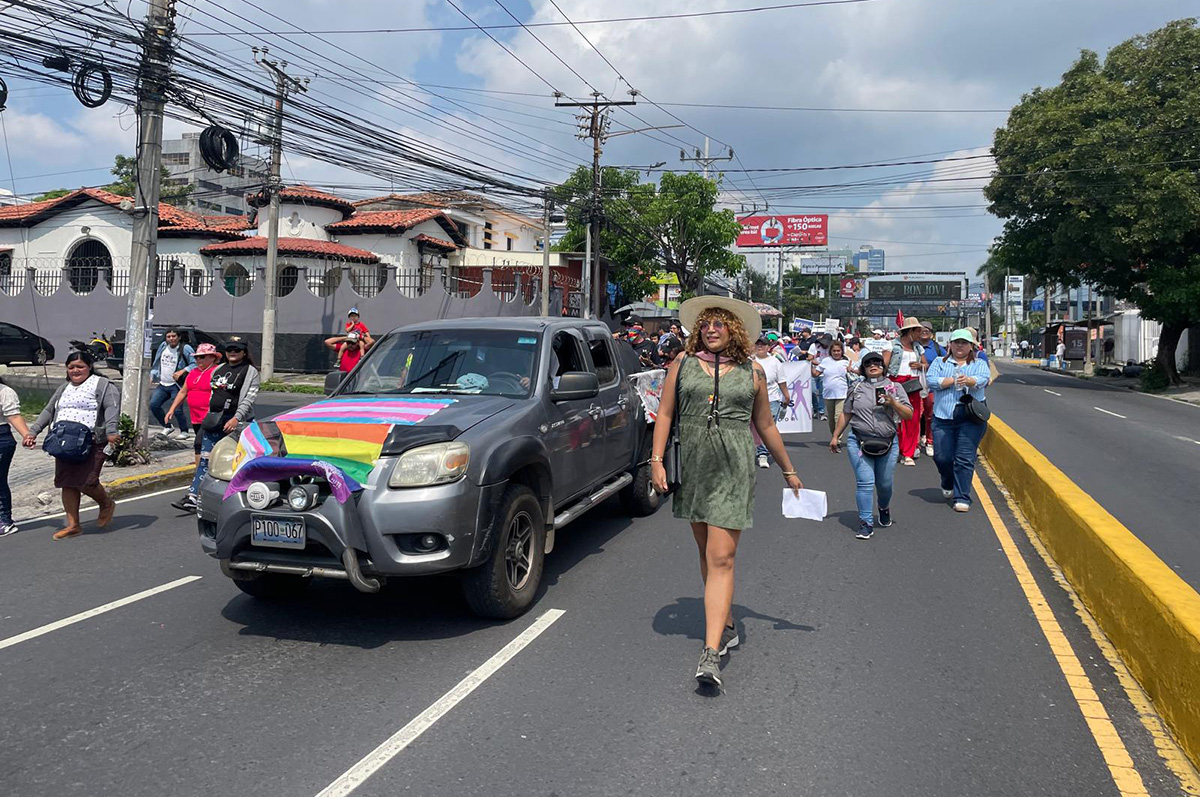
Chávez también asegura que para las personas que tienen expresiones de género diferentes a la norma u orientaciones sexuales diferente a la norma, es urgente que existan leyes de protección laboral y así las pocas personas que puedan entrar a un empleo más formal, no tengan que pasar por estas experiencias de no ser contratadas por su expresión de género o ser despedidas por lo mismo.
El decreto 56, fue un decreto emblemático que es mencionado siempre por activistas LGBTQ, ya que fue la primera vez que se tuvo la oportunidad de tener algún respaldo jurídico contra la discriminación en el ámbito laboral que lastimosamente solo tenía cobertura en el sector público, con empleados de gobierno.
Por su parte, una activista independiente de la diversidad sexual, que prefirió no revelar su nombre por razones de seguridad, lamentó la fragmentación actual del movimiento LGBTQ en El Salvador.
“Estamos en un contexto político donde las organizaciones tienen miedo o están cooptadas. Hay silencio, no hay propuestas, no hay diálogo. La comunidad diversa está siendo relegada también desde dentro”, señaló.
Ambas voces coinciden en que, hay mucho trabajo pendiente por hacer en favor de una población históricamente excluida, preocupa la situación en un país donde los discursos oficialistas y religiosos aún promueven la discriminación y la invisibilidad de las realidades LGBTQ en las agendas públicas.
La marcha del 1 de mayo volvió a ser un espacio donde convergieron múltiples voces, cuerpos y luchas. Desde sindicatos históricos hasta organizaciones estudiantiles, pasando por expresiones artísticas y personas independientes, la movilización dejó claro que las calles siguen siendo un escenario vital para demandar justicia social.
Aunque marcada por ausencias, como la escasa participación visible de colectivos LGBTQ, la marcha demostró que existen ganas de seguir alzando la voz, aunque sea desde distintas formas de expresión. Ya sea a través de pancartas, consignas o performances, las y los participantes coincidieron en una demanda central: respeto a los derechos laborales, condiciones dignas de trabajo y una vida libre de explotación.
En un contexto donde se criminaliza la protesta, se debilita la negociación colectiva y se precariza el empleo, el Día Internacional de las y los Trabajadores no fue solo una conmemoración, sino una reafirmación de que la lucha continúa. Una lucha plural, creativa y persistente que no se detendrá hasta que cada persona trabajadora, sin importar su identidad o condición, pueda vivir con dignidad.
-
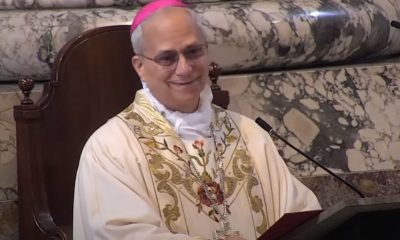
 The Vatican2 days ago
The Vatican2 days agoAmerican cardinal chosen as next pope
-
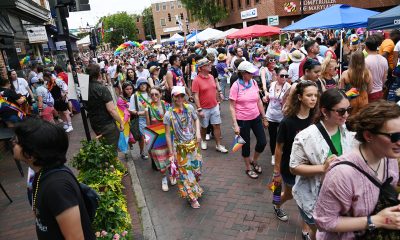
 a&e features2 days ago
a&e features2 days agoYour guide to the many Pride celebrations in D.C. region
-

 U.S. Supreme Court4 days ago
U.S. Supreme Court4 days agoSupreme Court allows Trump admin to enforce trans military ban
-
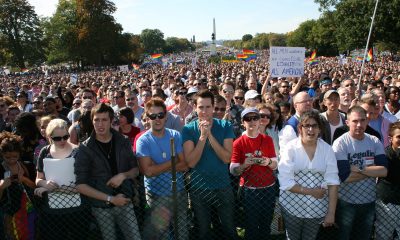
 District of Columbia3 days ago
District of Columbia3 days agoWorldPride permits for National Mall have yet to be approved

